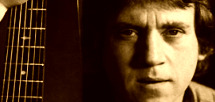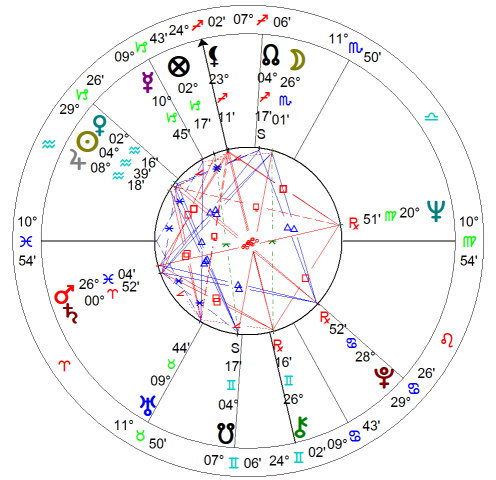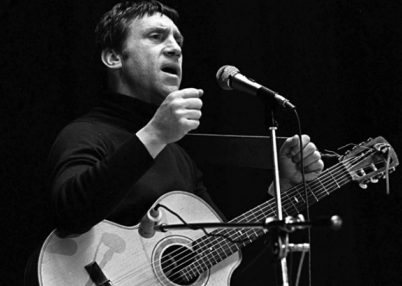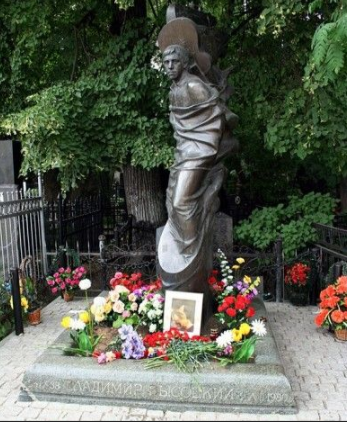Vladimir Vysotsky “Hamlet with a guitar”

Vladimir Vysotsky was many things: a man of mystery, a poet, an actor, a rebel, but who was he really? Once described as "Hamlet with a guitar", he was a man who broke many cultural and social taboos. He was much-admired for his unique singing style, husky voice, and his insightful and passionate lyrics, which featured social and political satire in an often humorous vernacular tone. Although not well known outside of eastern bloc during his lifetime, throughout the Soviet Union, he was regarded as "the voice of the heart of a nation." During his short and colorful life, his popularity and status grew from being the guy next door to a national hero. Today, some forty years after his death, his songs and poetry are still relevant, and his life is celebrated across multiple generations of Russian speaking people at home and abroad.
 Vladimir Vysotsky Natal Chart January 25, 1938, 9:48 AM, Moscow USSR Rating C, Rectified from mother's memory
Vladimir Vysotsky Natal Chart January 25, 1938, 9:48 AM, Moscow USSR Rating C, Rectified from mother's memory
Vladimir Vysotsky was born on January 25, 1938, in Moscow during the famous Moscow Trials. This period of history, known as "Great Purge," was a brutal political campaign led by Joseph Stalin to eliminate opposition, nonconforming members of the Communist Party, and anyone else he considered a threat. Although estimates vary, most experts believe at least 750,000 people were executed between 1936 and 1938. Also, more than a million innocent Soviet citizens were unjustly accused of treason and sent to forced labor camps, known as Gulags.
Vladimir's childhood was marked by calamity, both personal and national. The divorce of his parents, poverty, war, living in a cramped communal flat, and his neighbors' daily struggle made a great impression on young Vladimir. The earliest of his so-called outlaw songs reflected the hardships people experienced following the end of WWII. They portrayed criminals, drunkards, hooligans, and former gulag prisoners. Volodya (as his family called him) could easily imitate the accent and Moscow's speech thugs of that time. Although his immediate family members were not exiled or imprisoned in Gulags, as a strong Aquarian (Sun/Venus/Jupiter in Aquarius in 12th house), he very much identified with the national tragedy.
It is not surprising that with his need for drama and emotional intensity (Scorpio Moon trines Pluto in Cancer), Vladimir dropped out of engineering college to pursue a career in acting. Water being the dominant element in his nativity (Grand Water trine - Mars/Pluto/Moon and Pieces Ascendant), triggers a powerful emotional response from his audience. One of the most memorable of Vysotsky's roles in the Taganka Theater was Hamlet, which premiered in 1971 under the direction of Yuri Liubimov. Unlike the traditional Hamlet, Vysotsky's Hamlet came on stage dressed in modern tight black clothes, carrying his guitar rather than a sword. The idea was to show Hamlet as an individual, capable of challenging the establishment, his guitar a symbolic weapon stating that poetry can be as strong and as dangerous as steel. Many Shakespearean admirers rated him as one of the great performers of Hamlet of the 20th century.

The themes of war, terror, violence, sacrifice, and injustice are highly emphasized in his verse. Here is an excellent example of the emotional turbulence he creates in the famous "Fastidious horses," which became his signature song:
On a rugged cliff, the very edge, above the endless chasm
I keep lashing at my horses with my whip clenched in a spasm
But the air is growing thinner, I am gasping, drowning, crying
I can sense with horrid wonder, I am vanishing, I'm dying
chorus:
Slow your gallop, oh my horses! Slow your gallop I say!
Don't you listen to my stinging whip!
But the horses I was given, stubborn and so unforgiving,
Can't complete the life I'm living, can't conclude the verse I'm singing
I will stop for a blink, I will let horses drink
For a brief second more, I will stand on the brink. (1)
(trans. by Stanley Altshuller)
Aside from serious and tragic verses (natal Mercury in Capricorn trines Neptune in Virgo), Vysotsky was exceptionally good at fairytales and love stories. His other strong suit was satire. One of my favorite, "Song of an Anti-Semite":
Just being a hoodlum appears so trite
I ought to convert to an anti-Semite
This cause might not yet have the law on its side
But millions of zealots support it worldwide
One would get a thrashing if I so decide
But I need to know who is a Semite
What if they are held in the highest regard
What if for the trouble I get myself barred
But my drunkard pal with a wider worldview
Said that a Semite is just a plain Jew
Well, I am in luck, as it would appear
I am reassured there is nothing to fear
I worked up resolve, cause Albert Einstein
Was once a respected icon of mine
The people, forgive me, but I have to ask
Should Abraham Lincoln be also unmasked? (2)
(trans. by Gendelev)
It is well-known that Vladimir wrote over 600 songs on every subject imaginable during his short and very intense life. He was a workaholic who slept little, using the night hours to write his poetry. He regularly acted in the theater (his official job) and gave a multitude of unauthorized concerts at universities, in private apartments, village clubs, as well as impromptu open-air concerts in factory courtyards and parks.
Despite his celebrity status as an actor and musician and his marriage to a famous French movie star, Marina Vlady, he was never officially recognized as a poet and songwriter. None of his poetry formally was published during his lifetime, and the majority of his songs were recorded during live concerts with very primitive home equipment.
Sadly, Vysotsky had a dark side, his life marked by alcohol and drug addiction. He also had a reputation as a debaucher and a deeply conflicted man ( MC and ASC - ruled by 12th house Jupiter in conjunction with Black Moon Lilith, 1st house Mars in Pisces in opposition to Neptune). His song "Two Selves" accurately illustrates his inner state:
I am an exotic man, to put it mildly,
My tastes and my demands are rather strange,
I can, for instance, nibble glasses madly,
And read the works of Schiller for a change.
I have two "Selves" in me, two poles of planet,
Two absolutely different men, two foes,
When one is eager to attend a ballet
The other straight off to the races goes. (3)
(Translation by Alec Vagapov)
His final years were challenging as he struggled with both physical pain (which can only be relieved by narcotics) and mental anguish - inability to break the cycle of addiction. His way of dealing with the disease was self-medication and obsessive work. He knew that he lived on borrowed time, and in the battle with the disease, the disease was winning. His loved ones persuaded him to get help, and he received the best possible drug rehabilitation available in USSR and France. But unfortunately, the treatments he had turned out to be ineffective, and he continued to descend into the abyss of self-destruction. There was an episode on July 25, 1979 (exactly a year before his final demise on July 25, 1980 ), while touring in Uzbekistan he miraculously survived prolonged cardiac arrest after self-injecting pain medication (transiting nodes conjunct ASC/DSC axes).
Vladimir Vysostsky's life was brief, colorful and full of controversy. Sadly, it was cut short by a sudden heart attack at age 42. This happened just one week after opening of the famous Moscow Olympics. There was no official announcement of his death, and only a brief obituary appeared in the Moscow newspaper. Despite this, thousands, or some say possibly a million, came to say goodbye to the beloved poet. The government officials were terrified, as attendance at the Olympic events dropped noticeably on that day, and chaos ensued when scores of spectators left to attend the funeral.

He is buried at the entrance of Vagankovo Cemetery. There is always an abundance of fresh flowers on his gravesite as proof that the nation still loves and remembers one of its best contemporary poets.
Notes:
Links to translations.
www.kulichki.com/vv/eng/songs/gendelev.html
www.kulichki.com/vv/eng/songs/vagapov.html